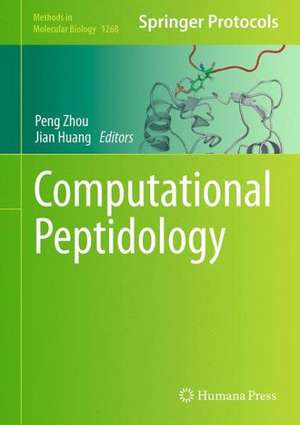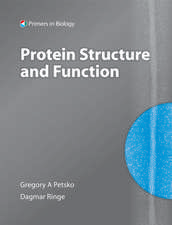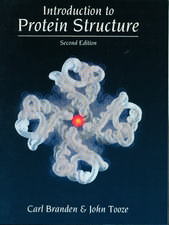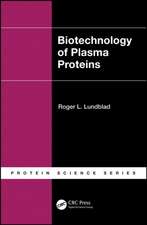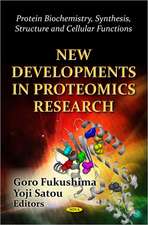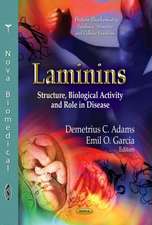Computational Peptidology: Methods in Molecular Biology, cartea 1268
Editat de Peng Zhou, Jian Huangen Limba Engleză Hardback – 3 ian 2015
Authoritative and practical, Computational Peptidology seeks to aid scientists in the further study into this newly rising subfield.
| Toate formatele și edițiile | Preț | Express |
|---|---|---|
| Paperback (1) | 374.37 lei 38-44 zile | |
| Springer – 24 sep 2016 | 374.37 lei 38-44 zile | |
| Hardback (1) | 405.48 lei 43-57 zile | |
| Springer – 3 ian 2015 | 405.48 lei 43-57 zile |
Din seria Methods in Molecular Biology
- 9%
 Preț: 791.59 lei
Preț: 791.59 lei - 23%
 Preț: 598.56 lei
Preț: 598.56 lei - 20%
 Preț: 882.95 lei
Preț: 882.95 lei -
 Preț: 252.04 lei
Preț: 252.04 lei - 5%
 Preț: 802.69 lei
Preț: 802.69 lei - 5%
 Preț: 729.61 lei
Preț: 729.61 lei - 5%
 Preț: 731.43 lei
Preț: 731.43 lei - 5%
 Preț: 741.30 lei
Preț: 741.30 lei - 5%
 Preț: 747.16 lei
Preț: 747.16 lei - 15%
 Preț: 663.45 lei
Preț: 663.45 lei - 18%
 Preț: 1025.34 lei
Preț: 1025.34 lei - 5%
 Preț: 734.57 lei
Preț: 734.57 lei - 18%
 Preț: 914.20 lei
Preț: 914.20 lei - 15%
 Preț: 664.61 lei
Preț: 664.61 lei - 15%
 Preț: 654.12 lei
Preț: 654.12 lei - 18%
 Preț: 1414.74 lei
Preț: 1414.74 lei - 5%
 Preț: 742.60 lei
Preț: 742.60 lei - 20%
 Preț: 821.63 lei
Preț: 821.63 lei - 18%
 Preț: 972.30 lei
Preț: 972.30 lei - 15%
 Preț: 660.49 lei
Preț: 660.49 lei - 5%
 Preț: 738.41 lei
Preț: 738.41 lei - 18%
 Preț: 984.92 lei
Preț: 984.92 lei - 5%
 Preț: 733.29 lei
Preț: 733.29 lei -
 Preț: 392.58 lei
Preț: 392.58 lei - 5%
 Preț: 746.26 lei
Preț: 746.26 lei - 18%
 Preț: 962.66 lei
Preț: 962.66 lei - 23%
 Preț: 860.21 lei
Preț: 860.21 lei - 15%
 Preț: 652.64 lei
Preț: 652.64 lei - 5%
 Preț: 1055.50 lei
Preț: 1055.50 lei - 23%
 Preț: 883.85 lei
Preț: 883.85 lei - 19%
 Preț: 491.88 lei
Preț: 491.88 lei - 5%
 Preț: 1038.84 lei
Preț: 1038.84 lei - 5%
 Preț: 524.15 lei
Preț: 524.15 lei - 18%
 Preț: 2122.34 lei
Preț: 2122.34 lei - 5%
 Preț: 1299.23 lei
Preț: 1299.23 lei - 5%
 Preț: 1339.10 lei
Preț: 1339.10 lei - 18%
 Preț: 1390.26 lei
Preț: 1390.26 lei - 18%
 Preț: 1395.63 lei
Preț: 1395.63 lei - 18%
 Preț: 1129.65 lei
Preț: 1129.65 lei - 18%
 Preț: 1408.26 lei
Preț: 1408.26 lei - 18%
 Preț: 1124.92 lei
Preț: 1124.92 lei - 18%
 Preț: 966.27 lei
Preț: 966.27 lei - 5%
 Preț: 1299.99 lei
Preț: 1299.99 lei - 5%
 Preț: 1108.51 lei
Preț: 1108.51 lei - 5%
 Preț: 983.72 lei
Preț: 983.72 lei - 5%
 Preț: 728.16 lei
Preț: 728.16 lei - 18%
 Preț: 1118.62 lei
Preț: 1118.62 lei - 18%
 Preț: 955.25 lei
Preț: 955.25 lei - 5%
 Preț: 1035.60 lei
Preț: 1035.60 lei - 18%
 Preț: 1400.35 lei
Preț: 1400.35 lei
Preț: 405.48 lei
Nou
Puncte Express: 608
Preț estimativ în valută:
77.59€ • 81.21$ • 64.58£
77.59€ • 81.21$ • 64.58£
Carte tipărită la comandă
Livrare economică 31 martie-14 aprilie
Preluare comenzi: 021 569.72.76
Specificații
ISBN-13: 9781493922840
ISBN-10: 149392284X
Pagini: 352
Ilustrații: XI, 338 p. 69 illus., 43 illus. in color.
Dimensiuni: 178 x 254 x 25 mm
Greutate: 0.83 kg
Ediția:2015
Editura: Springer
Colecția Humana
Seria Methods in Molecular Biology
Locul publicării:New York, NY, United States
ISBN-10: 149392284X
Pagini: 352
Ilustrații: XI, 338 p. 69 illus., 43 illus. in color.
Dimensiuni: 178 x 254 x 25 mm
Greutate: 0.83 kg
Ediția:2015
Editura: Springer
Colecția Humana
Seria Methods in Molecular Biology
Locul publicării:New York, NY, United States
Public țintă
Professional/practitionerCuprins
De Novo Peptide Structure Prediction: An Overview.- Molecular Modeling of Peptides.- Improved Methods for Classification, Prediction, and Design of Antimicrobial Peptides .- Building MHC Class II Epitope Predictor Using Machine Learning Approaches.- Dynamics (UHBD) Program.- Computational Prediction of Short Linear Motifs from Protein Sequences.- Peptide Toxicity Prediction.- Synthetica Structural Routes For The Rational Conversion of Peptides Into Small Molecules.- In Silico Design Of Antimicrobial Peptides.- Information-Driven Modelling Of Protein-Peptide Complexes “Information-Driven Peptide Docking”.- Computational Approaches To Developing Short Cyclic Peptide Modulators Of Protein-Protein Interactions.- A Use of Homology Modeling And Molecular Docking Methods: To Explore Binding Mechanisms of Nonylphenol And Bisphenol a with Antioxidant Enzymes.- Computational Peptide Vaccinology.- Computational Modeling Of Peptide-Aptamer Binding.
Textul de pe ultima copertă
In this volume expert researchers detail in silico methods widely used to study peptides. These include methods and techniques covering the database, molecular docking, dynamics simulation, data mining, de novo design and structure modeling of peptides and protein fragments. Chapters focus on integration and application of technologies to analyze, model, identify, predict, and design a wide variety of bioactive peptides, peptide analogues and peptide drugs, as well as peptide-based biomaterials. Written in the highly successful Methods in Molecular Biology series format, chapters include introductions to their respective topics, lists of the necessary materials and reagents, step-by-step, readily reproducible laboratory protocols, and key tips on troubleshooting and avoiding known pitfalls.
Authoritative and practical, Computational Peptidology seeks to aid scientists in the further study into this newly rising subfield.
Authoritative and practical, Computational Peptidology seeks to aid scientists in the further study into this newly rising subfield.
Caracteristici
Includes cutting-edge methods and protocols Provides step-by-step detail essential for reproducible results Contains key notes and implementation advice from the experts
